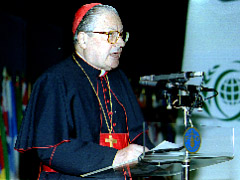


HOLY SEE - SAINT-SIEGE - SANTA SEDE | ||
His Eminence Cardinal Angelo Sodano, Secretary of State, Holy See | ||

My first duty is to thank you for the warm welcome which you gave to His Holiness Pope John Paul II at the opening ceremony of this World Summit! He wished to renew to FAO the support of the Holy See and the whole Catholic Church for the noble initiatives which are being undertaken in order to guarantee food security for all the Earth's inhabitants. In fact, the existence of an Observator Mission of the Holy See to FAO, and the presence of a Special Delegation at this World Summit, demonstrates that the Holy See gives enormous importance to the activities of FAO located here in the heart of old Rome in order to call all nations of the world to cooperate in such a vital area as that of food and agriculture. We are all aware that what we are dealing with is a major problem of international cooperation. If millions of people are still marked by the damaging effects of hunger and malnutrition, the cause is not to be sought in the lack of food. Only last year, FAO acknowledged in its "Atlas of Food and Agriculture" that there is enough in the world to meet the energy needs of all, but unfortunately there is no uniformity in food production or distribution (FAO, Dimension of Need and Resources, Atlas of Food and Agriculture, Rome 1995, p. 16). Our Organization had in fact already said this in the final statement of the International Conference on Nutrition, held jointly with the World Health Organization in 1992. (Final Report of the Conference, No.1) What was said was that the Earth's resources taken globally are capable of feeding all its inhabitants. On the basis of this data, the Holy See maintains that the challenge of the present moment - to give food security to all the people of the five continents - is not only an economic and technical challenge but in the first place an ethical and a spiritual one. It is a question of solidarity lived in the light of certain basic principles, which I would like to underline here, briefly. The first principle of our commitment to solidarity is respect for every human person. Whoever that person may be, he or she possesses inalienable rights. And for believers, every human person is created in the image and likeness of God himself. This is a teaching which can transform our whole vision of life, society and history. The second principle is that of solidarity. If individual human beings possess their own inalienable dignity, when they need our help we are bound to give it to them. For us believers, this also constitutes a specific duty, explicitly given to us by Christ. Throughout history, this principle has inspired the best moral and juridical traditions. Here in Italy, more than 800 years ago, the famous decree of Gratian set down this rule "feed the man dying of hunger, because if you have not fed him, you have killed him" (Distinction LXXXVI, c.21). A third principle inspiring our social activity is that of the universal destination of the goods of the Earth. Consequently, whatever forms property may take, forms adapted to the legitimate institutions of the peoples, we hold that "attention must always be paid to the universal purpose for which created goods are meant. In using them, therefore, a man should regard his lawful possessions not merely as his own but also as common property in the sense that they should accrue to the benefit of not only himself but of others." (Second Vatican Council, Gaudium et Spes, 69). A fourth principle inspiring the Holy See's activity in the international sphere is the promotion of peace. Often people die of hunger because war is taking place where they live. The tragedy in Africa, in the region of the Great Lakes, clearly reminds us that the plague of poverty and hunger can be eliminated only if peace is restored between peoples. I have briefly spelled out the solidarity from which the Holy See seeks to draw inspiration in its desire to work with all governments, with international organizations, and in particular with FAO, in order to eradicate from the world the scourge of hunger and to give everyone the possibility of having his daily bread. It is for this reason that the Holy See joins the other nations which have manifested their assent to the final documents of the Summit. However, in view of its particular nature and mission, the Holy See would like to present certain reservations and its own Statement of Interpretation and request that they be included in the Final Report of this Summit. | ||
|
|
|
|

 |